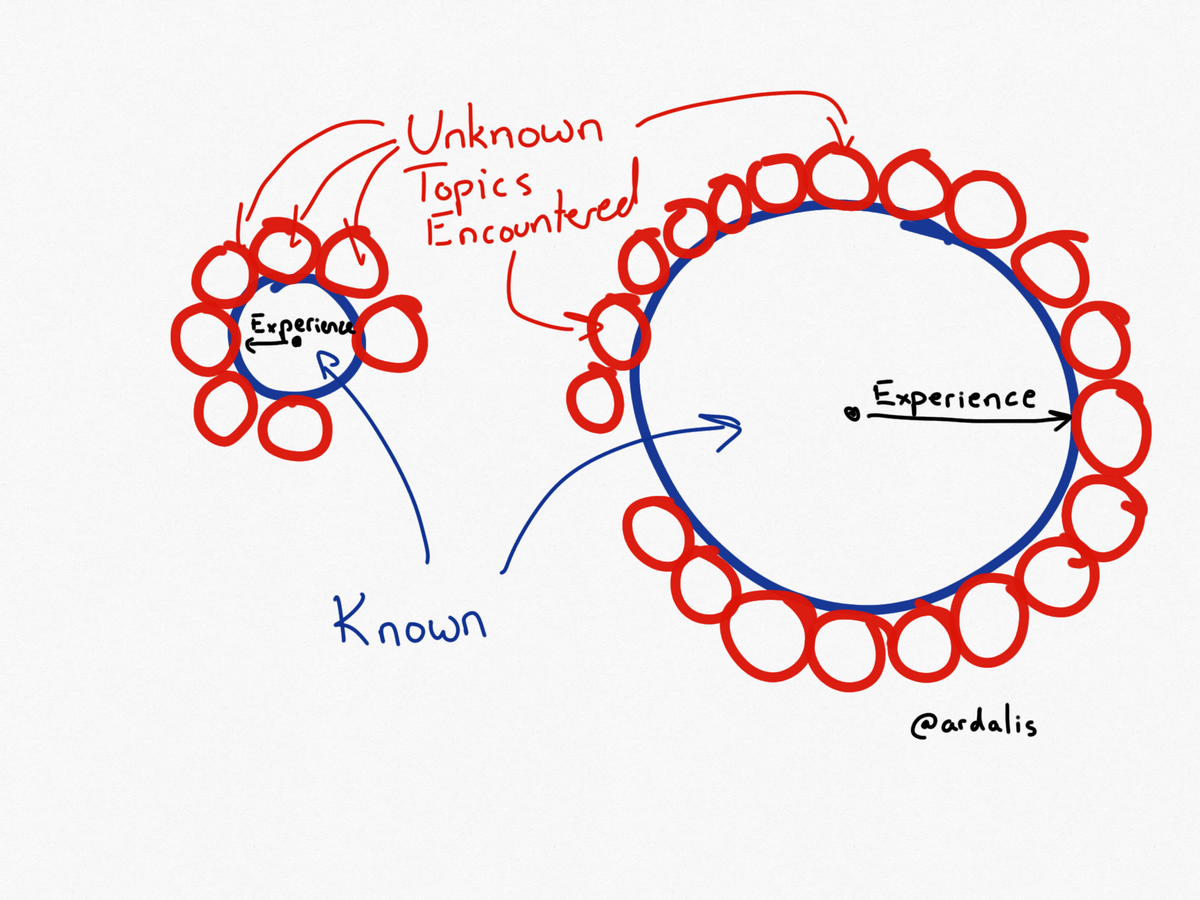The More You Know The More You Realize You Don't Know

알면 알수록 너가 모른다는것을 인식하는 것이다.
The More You Know The More You Realize You Don't Know

Aristotle famously wrote, "The more you know, the more you realize you don't know."

위의 이미지에서 경험이 커짐에 따라 이것이 자신감에 미치는 영향을 볼 수 있습니다. 처음에는 경험이 없다는 것을 알기 때문에 자신감이 낮습니다. 그러나 잠시 후, 당신은 "그것을 얻을"시작하고, 당신은 안락 지대에 들어갑니다.
당신의 환경이 얼마나 까다로운지에 따라, 당신은 아주 오랫동안 거기에 머무를 수도 있지만, 당신이 밀려나고 있다면 당신이 아직 마스터하지 못한 것이 훨씬 더 많다는 것을 깨닫기 때문에 "절망의 골짜기"로 빨리 떨어질 것입니다. 거기에서 일반적으로 당신의 자신감은 당신의 경험이 증가함에 따라 커집니다.
In the image above, you can see the effect this has on confidence as one's experience grows. Initially, your confidence is low since you know you're inexperienced. However, after a short while, you start to "get it", and you get into a comfort zone. Depending on how demanding your environment is, you might stay there for a very long time, but if you're being pushed you'll likely quickly fall down into the "valley of despair" as you realize there's a lot more you haven't yet mastered. From there, generally your confidence grows as your experience increases. This is known as the Dunning-Kruger effect.
Consider how this compares to Imposter Syndrome, in which one's confidence is much lower than it should be given one's experience. This graph does a good job of setting the two off against one another:

Dunning-Kruger mainly only applies when you have limited experience, and are overconfident. Imposter Syndome comes into play when you have experience and skill, but feel like you're inadequate relative to others. They're flip sides of the same coin, and the best way to combat both of these is to surround yourself with peers of various experience levels and put yourself into situations where your ability can be measured in some form and respond to actual feedback, rather than just listening to your own subconscious.
I've heard someone describe the relationship between experience and confidence using the metaphor of an expanding circle. Your knowledge is represented by the inside of the circle, and everything you don't yet know is outside. As you learn more, you push the circle outward, increasing its area. But you also increase the circumference of the circle, thus increasing your contact with things you don't yet know. I thought this was a great way to look at this, and made a sketch to demonstrate the idea:

Knowns and Unknowns
Of course, you can extend this diagram further and apply Rumsfeld's famous quote about unknown unknowns. The more experience you have, the more things there are that you know you know. But also, the more things you know you don't know. And no matter what, there will always be a large (perhaps infinite) number of unknown unknowns:

Knowns, Known Unknowns, and Unknown Unknowns
As you actually gain experience, try to reflect on it. Perhaps you now have a deeper knowledge of a particular topic or technology. Probably there are things you never realized were even a consideration, that now you at least are aware of. Try to keep in mind that most of the things you have a cursory knowledge of, but which really are known unknowns to you, probably are similar in that if you were to really dive into them, you'd find there's a lot more to them than you realize now. Doing this has several benefits. It helps keep your ego in check. It helps keep your curiosity and willingness to learn alive. And it helps you develop and maintain respect for others who maybe have taken the time to learn more about a topic about which you've only scratched the surface. What's the downside?
My Weekly Dev Tips podcast episodes are going up on YouTube now with visualizations by One Squiggly Line. Check them out and subscribe here.
출처:

